
In 2002, former president George W. Bush, authorized the use of especially brutal interrogation tactics against suspected Al-Qaeda operatives, over objections from interrogators. Former intelligence officials and a footnote in a newly released legal memorandum, said the harsh interrogation techniques had been ordered, regardless of if the the interrogators believed that a prisoner had already told them all that they knew. Providing much less valuable information under less severe treatment, than the harsher tactics, which produced no breakthroughs.
The War Crimes Act of 1996, a federal statute set forth at 18 U.S.C. § 2441, makes it a federal crime for any U.S. national, whether military or civilian, to violate the Geneva Convention by engaging in murder, torture, or inhuman treatment.
Although the U.S. did opt out of the Geneva Convention for the Afghanistan war, which is questionable. What took place in Iraq is fully covered by International Law. In fact, the Secretary General of Amnesty International wrote an urgent letter concerning detainees in U.S. custody in 2002, warning against the "cruel, inhuman or degrading treatment or punishment," could result in violations of the Convention Against Torture. Despite this, former president George W. Bush Central Intelligence Agency officials, for the first time, to use waterboarding and other harsh treatments.
What legal analysis could possibly allow such a thing?? Well according to a memo released in 2003, the Bush administration argued that, during wartime, the president's Commander-in-Chief power overrides the due process guarantee of the Fifth Amendment. If you believe this memo, there is no limit at all to the kinds of interrogation methods the President can authorize, or who he can use these methods against, including U.S. citizens.
Critics of the memo view the legal thinking behind it as flawed. Then Navy general counsel Alberto Mora identified it as a "dangerous document" that "spots some of the legal trees, but misses the constitutional forest. Because it identifies no boundaries to action — more, it alleges there are none — it is virtually useless as guidance.
What is certain is that this memo will be seen as one of the most extreme deviations from the rule of law and from the President's obligation to take care that the law is faithfully executed

No comments:
Post a Comment